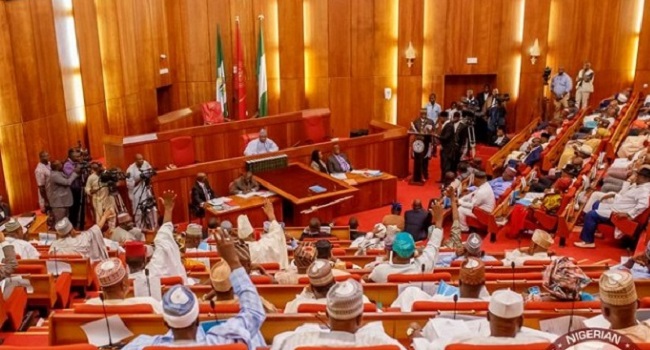Politics
Like Reps, Senators move to appeal Court ruling allowing appointees contest primaries in office

The contentious Section 84 has continued to divide opinions amongst political observers as the Senate on Tuesday passed a motion to appeal the judgement of the Federal High Court, Umuahia, on Section 84(12) of the Electoral Act 2022.
The motion, titled “Urgent need to appeal the Judgment of the Federal High Court, Umuahia, on Suit No: FHC/UM/CS/26/2022, on Section 84(12) of the Electoral Act 2022″, was sponsored by Sen. George Sekibo (PDP-Rivers) and co-sponsored by 81 Senators.
According to the lawmakers, there was the need to adhere to the rule of law in order to appeal the judgment for the Appeal Court to set aside the Umuahia judgment.
Sekibo, in his lead debate, observed that a court in Umuahia, Abia, had in a suit marked FHC/MU/SC/26/2022, faulted the provision of Section 84(12) of the Electoral Act 2022, and declared it unconstitutional, invalid, illegal, null, void and of no effect.
Section 84(12) of the Electoral Act 2022 states as follows: “No political appointee at any level shall be a voting delegate or be voted for at the convention or congress of any political party for the purpose of the nomination of candidates for any election.”
According to Sekibo, the Judge, in his ruling, said that Section 84(12) of the Electoral Act 2022 was inconsistent with Sections 66(1)(f), 107(1)(f), 137(1)(g) and 182(1)(g) of the 1999 Constitution of the Federal Republic of Nigeria as amended.
READ ALSO: Reps to appeal court ruling on Section 84, petition NJC
“Notes that for ease of reference, the Sections relied upon in the judgment as stated above are as follows:
“Section 66(1): No person shall be qualified for election to the Senate or the House of Representatives.
“(f) If he is a person employed in the public service of the Federation or of any State and has not resigned, withdrawn or retired from such employment 30 days before the date of election.
“Section 107 (1)(f) (1): No person shall be qualified for election to a House of Assembly if – (f) he is a person employed in the public service of the Federation or of any State and he has not resigned, withdrawn or retired from such employment thirty days before the date of election.
“Section 137(1)(g) (1): A person shall not be qualified for election to the office of President if: (g) being a person employed in the civil or public service of the Federation or of any state, has not resigned, withdrawn or retired from the employment at least thirty days before the date of the election.
“Section 182(1)(g) 182 (1): No person shall be qualified for election to the office of Governor of a State if (g) being a person employed in the public service of the Federation or of any State, he has not resigned, withdrawn or retired from the employment at least thirty days to the date of the election.
“Note further that Section 4 (1,2 and 3) of the 1999 Constitution of the Federal Republic of Nigeria as amended vested the power of law making for the Federal Republic of Nigeria on the National Assembly.
“The legislative powers of the Federal Republic of Nigeria shall be vested in a National Assembly for the Federation, which shall consist of a Senate and a House of Representatives.
“Aware also that in furtherance to the powers vested in the National Assembly, the 1999 Constitution under the roles of the Executive in that deals with political parties in Section 228 (a, b and d) confers more powers on the National Assembly, more particularly on political parties and effective management of the electoral process by the Independent National Electoral Commission.
“That the National Assembly may by law provide – (a) guidelines and rules to ensure internal democracy within political parties, including making laws for the conduct of party primaries; party congresses and party conventions.
“(b) The conferment on the Independent National Electoral Commission of powers as may appear to the National Assembly to be necessary or desirable for the purpose of enabling the Commission more effectively ensure that political parties observe the practices of internal democracy, including the fair and transparent conduct of party primaries, party congresses and party conventions,” Sekibo explained.
He said the Electoral Act 2022 enacted by the National Assembly followed due process of the provisions of the 1999 Constitution.
Sekibo said there was a difference between the civil service or public service and political appointment.
He said that the Senate should show concern on the judgment, especially when opportunity was not given for the Senate to represent itself in a matter that emanated from her legitimate functions.
Join the conversation
Support Ripples Nigeria, hold up solutions journalism
Balanced, fearless journalism driven by data comes at huge financial costs.
As a media platform, we hold leadership accountable and will not trade the right to press freedom and free speech for a piece of cake.
If you like what we do, and are ready to uphold solutions journalism, kindly donate to the Ripples Nigeria cause.
Your support would help to ensure that citizens and institutions continue to have free access to credible and reliable information for societal development.
























